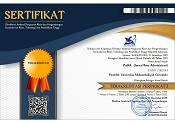Development of Green Open Space Policy in The Order to Realize A Sustainable City in Malang
Abstract
The current massive industrial development in urban areas that is not balanced with reforestation practices will have an impact on the environment such as air pollution, hot environmental conditions, flooding, and the lack of adequate Green Open Space. Therefore, good urban spatial planning is needed through the development of green open space in urban areas to maintain or facilitate urban settlements and reforestation practices for the future urban sustainability agenda so that there is a balance in terms of the economic, social, and natural environment as a form of a sustainable city. In analyzing the problem of this research using the literature study method by analyzing the results and information from previous studies. The result of the research is that the development of green open space in Malang City has not been fully managed properly, this is in accordance with the percentage of public green open space in Malang City which is only 1.362.32 Ha or 12.38% which the results of this percentage are still far from the minimum proportion of public green open space, which is 20% of the area of Malang City. As less than the maximum development of green open space, it will also have an impact on a sustainable city that runs less than optimally.
Keywords
Full Text:
PDFReferences
Ashari. (2018). Analisis Kebijakan Ruang Terbuka Hijau (RTH) Dalam Rangka Mewujudkan Visi Pembangunan Kota Malang “Kota Sehat Dan Ramah Lingkungan.” Universitas Muhammadiyah Malang.
Baharudin, F., Mardhani, A. B., & Romadloni, M. (2019). Pola Pemantapan Penataan Ruang Terbuka Hijau Untuk Kawasan Kota Berkembang Di Batu Sopang Kabupaten Paser. Jurnal Manajemen Aset Infrastruktur & Fasilitas. https://Doi.Org/10.12962/J26151847.V3i0.5733
Bidang Komunikasi Dan Informasi Publik. (2020). Kota Malang Terus Berupaya Tambah RTH. Pemerintah Kota Malang. https://Malangkota.Go.Id/2020/02/13/Kota-Malang-Terus-Berupaya-Tambah-Rth/
Budhihardjo, E. (2005). Kota Berkelanjutan. Bandung: Alumni.
Bungin. (2011). Penelitian Kualitatif. Jakarta: Kencana Prenada Media.
Diinillah, A. S., & Sulistyarso, H. (2017). Preferensi Pemerintah Terhadap Pengembangan Ruang Terbuka Hijau Publik Di Kota Malang Melalui Program Corporate Social Responsibility (CSR). Jurnal Teknik ITS. https://Doi.Org/10.12962/J23373539.V6i2.25350
Hayat, H. (2014). Implementasi Kebijakan Penataan Ruang Terbuka Hijau. Jurnal Ilmu Administrasi Negara.
Mori, K., & Christodoulou, A. (2012). Review Of Sustainability Indices And Indicators: Towards A New City Sustainability Index (CSI). In Environmental Impact Assessment Review. https://Doi.Org/10.1016/J.Eiar.2011.06.001
Mulyani, T. (2020). Pemkot Malang Perluas Ruang Terbuka Hijau. Malangdaily.Com. Https://Malangdaily.Com/2020/02/Pemkot-Malang-Perluas-Ruang-Terbuka-Hijau/
Musa, H. D., Yacob, M. R., & Abdullah, A. M. (2019). Delphi Exploration Of Subjective Well-Being Indicators For Strategic Urban Planning Towards Sustainable Development In Malaysia. Journal Of Urban Management. https://Doi.Org/10.1016/J.Jum.2018.08.001
Nurliah, & Tajuddin, M. S. (2020). Analisis Tata Kelola Ruang Terbuka Hijau Terhadap Pembangunan Kota Di Kabupaten Majene. Jurnal Ilmu Pemerintahan Dan Ilmu Komunikasi.
Ruslan, R. (2017). Analisis Tata Kelola Ruang Terbuka Hijau Terhadap Pembangunan Kota Di Kabupaten Majene. Universitas Hasanudin Makassar.
Sarwono. (2006). Metode Penelitian Kuantitatif Dan Kualitatif. Graha Ilmu.
Subadyo, A. T., Tutuko, P., & Jati, R. M. B. (2019). Implementation Analysis Of Green City Concept In Malang - Indonesia. International Review For Spatial Planning And Sustainable Development. https://Doi.Org/10.14246/Irspsd.7.2_36
Tappert, S., Klöti, T., & Drilling, M. (2018). Contested Urban Green Spaces In The Compact City: The (Re-)Negotiation Of Urban Gardening In Swiss Cities. Landscape And Urban Planning. https://Doi.Org/10.1016/J.Landurbplan.2017.08.016
Wakhidah, K. (2008). Eco Urban Design Dan Dukungan Kebijakan Pemerintah. Eco Urban Design Potensi Dan Tantangan Perencanaan Kota-Kota Indonesia Di Masa Mendatang.
Wikantiyoso, R., & Suhartono, T. (2018). The Role Of CSR In The Revitalization Of Urban Open Space For Better Sustainable Urban Development. International Review For Spatial Planning And Sustainable Development. https://Doi.Org/10.14246/Irspsd.6.4_5
Article metrics
Refbacks
- There are currently no refbacks.
Copyright (c) 2021 Publik (Jurnal Ilmu Administrasi)

This work is licensed under a Creative Commons Attribution-ShareAlike 4.0 International License.

Publik (Jurnal Ilmu Administrasi) is licensed under a Creative Commons Attribution-ShareAlike 4.0 International License.










